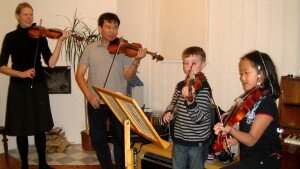Future
Our project in Vietnam is not necessarily an experimental project, since it does not pose new questions about where culture may be going. It does not identify new problems or social issues within the society itself. Rather, it may be seen as a modest attempt at supporting what is already there, by helping to solve some of the daily problems of the existing institutions, by providing resources to ensure continuous better training as well as better international networking, by improving the standards of performance on many levels, from the administrative person to the soloist, from the youngest talent to the mature musician. Through this collaboration, we try to find answers to some direct needs among the leading musicians of today’s Vietnam.
We – as visitors and organizers – know a lot more about the situation in Vietnamese music than we did five years ago, and we are quite sure the Vietnamese musicians also know a lot more themselves, after these first three years. What we have experienced during these years is a growing pride in the music scene in Vietnam, with higher ambitions. In HCMC, the city politicians now want to build a new opera. In Hanoi, the orchestra is continuously trying to improve their level by inviting leading conductors and soloists, by spending a lot of time training just to be better in concerts. But there are a number of challenges to build on for the future:
1. How to improve the links between the music institutions and the general public?
2. How can one create a closer collaboration between composers and musicians?
3. What is needed in order to be able to speak of the classical music sector in Vietnam as a dynamic sector?
These issues will be in the focus for the coming three years.



